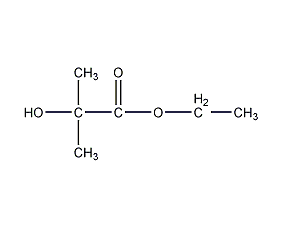
structural formula
| business number | 01r8 |
|---|---|
| molecular formula | c6h12o3 |
| molecular weight | 132.16 |
| label |
2-methyl ethyl lactate, ethyl-2-methyllactate, ethyl 2-hydroxy-2-methylpropanoate, solvents for coatings |
numbering system
cas number:80-55-7
mdl number:mfcd00004458
einecs number:201-290-3
rtecs number:od5672000
brn number:878308
pubchem number:24894496
physical property data
1. properties: colorless or light yellow liquid with aromatic smell.
2. relative density (g/ml, 20/4℃): 0.987
3. relative vapor density (g/ml, air=1): uncertain
4. melting point (ºc): uncertain
5. boiling point (ºc, normal pressure): 147.5~149
6. boiling point (ºc, 5.2kpa): uncertain
7. refractive index (20ºc): 1.4080
8. flash point (ºc, closed): 44
9. specific rotation (º ): uncertain
10. autoignition point or ignition temperature (ºc): uncertain
11. vapor pressure (kpa, 46ºc): 1.87
12. saturated vapor pressure (kpa, 60ºc): uncertain
13. heat of combustion (kj/mol): uncertain
14. critical temperature (ºc): uncertain
15. critical pressure (kpa): uncertain
16. log value of oil-water (octanol/water) partition coefficient: uncertain
17. explosion upper limit (%, v/v): uncertain
18. lower explosion limit (%, v/v): uncertain
19. solubility: can be mixed with alcohol, ether, etc. the main organic solvents are miscible. it can dissolve nitrocellulose, cellulose acetate, etc., but the dissolution rate is slow, and the viscosity of the resulting solution is smaller than amyl acetate and larger than ethyl lactate. the solubility is similar to that of ethyl lactate.
toxicological data
pig muscle ldlo: 2200mg/kg;
ecological data
none yet
molecular structure data
1. molar refractive index: 33.12
2. molar volume (cm3/mol): 128.6
3. isotonic specific volume (90.2k ): 307.4
4. surface tension (dyne/cm): 32.6
5. polarizability (10-24cm3): 13.13
compute chemical data
1. reference value for hydrophobic parameter calculation (xlogp): 0.4
2. number of hydrogen bond donors: 1
3. number of hydrogen bond acceptors: 3
4. number of rotatable chemical bonds: 3
5. number of tautomers: none
6. topological molecule polar surface area 46.5
7. number of heavy atoms: 9
8. surface charge: 0
9. complexity: 107
10. number of isotope atoms: 0
11. determine the number of atomic stereocenters: 0
12. uncertain number of atomic stereocenters: 0
13. determine the number of chemical bond stereocenters: 0
14. number of uncertain chemical bond stereocenters: 0
15. number of covalent bond units: 1
properties and stability
1. it is not easily hydrolyzed and decomposes slightly at the boiling point.
2. exist in mainstream smoke.
storage method
pay attention to fire sources and store in a cool and ventilated place.
synthesis method
refining method: contains impurities such as free acid, alcohol and water. during refining, it is dried with anhydrous potassium carbonate or sodium sulfate and then distilled.
purpose
used in organic synthesis. solvent for cellulose acetate and nitrocellulose. it is mainly used as a solvent for coatings. due to its slow evaporation rate, it can be added to cellulose ester coatings to make the coating surface beautiful and have good brushing performance.

 微信扫一扫打赏
微信扫一扫打赏

